Bidenomics At Work
-
All these wonderful new jobs, yet the massive layoffs last year are still affecting employee moral and confidence…
-
@Jolly said in Bidenomics At Work:
- We always add seasonal jobs this time of year.
The article gives you not only December figures, but also figures for the whole of 2023.
- Take government jobs out of the figures and get back to me.
If you think that will make a meaningful difference, you show the work and explain why the difference is meaningful.
@Axtremus said in Bidenomics At Work:
@Jolly said in Bidenomics At Work:
- We always add seasonal jobs this time of year.
The article gives you not only December figures, but also figures for the whole of 2023.
- Take government jobs out of the figures and get back to me.
If you think that will make a meaningful difference, you show the work and explain why the difference is meaningful.
Did you actually read and comprehend the article you linked? 52K. 25% of the new jobs. They averaged 56K new jobs per month over the year, or 672K over the year.
-
By the way, did you notice they also revised October numbers again? They’ve dropped it over 35% over the past two months.
-
By the way, did you notice they also revised October numbers again? They’ve dropped it over 35% over the past two months.
@LuFins-Dad said in Bidenomics At Work:
By the way, did you notice they also revised October numbers again? They’ve dropped it over 35% over the past two months.
They tend to do that, dont'cha know.
-
@LuFins-Dad said in Bidenomics At Work:
By the way, did you notice they also revised October numbers again? They’ve dropped it over 35% over the past two months.
They tend to do that, dont'cha know.
@George-K said in Bidenomics At Work:
@LuFins-Dad said in Bidenomics At Work:
By the way, did you notice they also revised October numbers again? They’ve dropped it over 35% over the past two months.
They tend to do that, dont'cha know.
Tale as old as time, but not 35% over 60 days... That’s a more recent story…
-
WSJ: https://www.wsj.com/articles/the-welfare-industrial-complex-is-booming-3a7ad15c
The Welfare-Industrial Complex Is Booming
Allysia Finley is a member of the Journal's Editorial Board.
Drill into the nation’s 3.7% unemployment rate, and you’ll find a growing welfare-industrial complex beneath the seemingly strong labor market. Government, social assistance and healthcare account for 56% of the 2.8 million net new jobs over the past year, and for nearly all gains in blue states such as New York and Illinois.
The tens of thousands of migrants pouring into big cities need to be tended to. So do the hundreds of thousands of drug-addled and mentally ill homeless living on the streets. Progressive government doesn’t do anything on the cheap. America’s welfare state has thus become a proverbial Big Dig, and it keeps getting bigger.
New York City is spending $394 a day—or $143,810 a year—to house and feed each migrant, many in formerly posh hotels. Mayor Eric Adams grouses about the flood of migrants, but what does he expect when the city makes itself a welfare magnet?
Meantime, the homeless population continues to swell, even as government shovels more money into housing subsidies—nearly $43 billion in the Democrats’ March 2021 Covid bill alone. The number of homeless shot up 85,389 between 2019 and 2023, with California and New York combined accounting for about half the increase, according to a recent federal government report.
A 2017 report from Orange County United Way, a nonprofit in Irvine, Calif., estimated that each chronically homeless person living on the streets and in emergency shelters costs the public $85,631 a year, largely owing to high healthcare expenses from repeat trips to the emergency room. The $837,000 Los Angeles is spending to build a single housing unit for the homeless almost appears frugal by comparison.
Democratic Los Angeles City Councilman Kevin de León accused leftists of bribing vagrants to reject the city’s offer of temporary shelter. The self-proclaimed homeless advocates denied paying bribes, claiming they were merely seeking to protect homeless people’s right to “self-determination.”
Such advocates—some supported by taxpayer dollars—have sued local governments to stop encampments from being cleared. During the Biden presidency, employment at “social advocacy organizations” has exploded. Every migrant, vagrant and endangered species apparently needs an advocate.
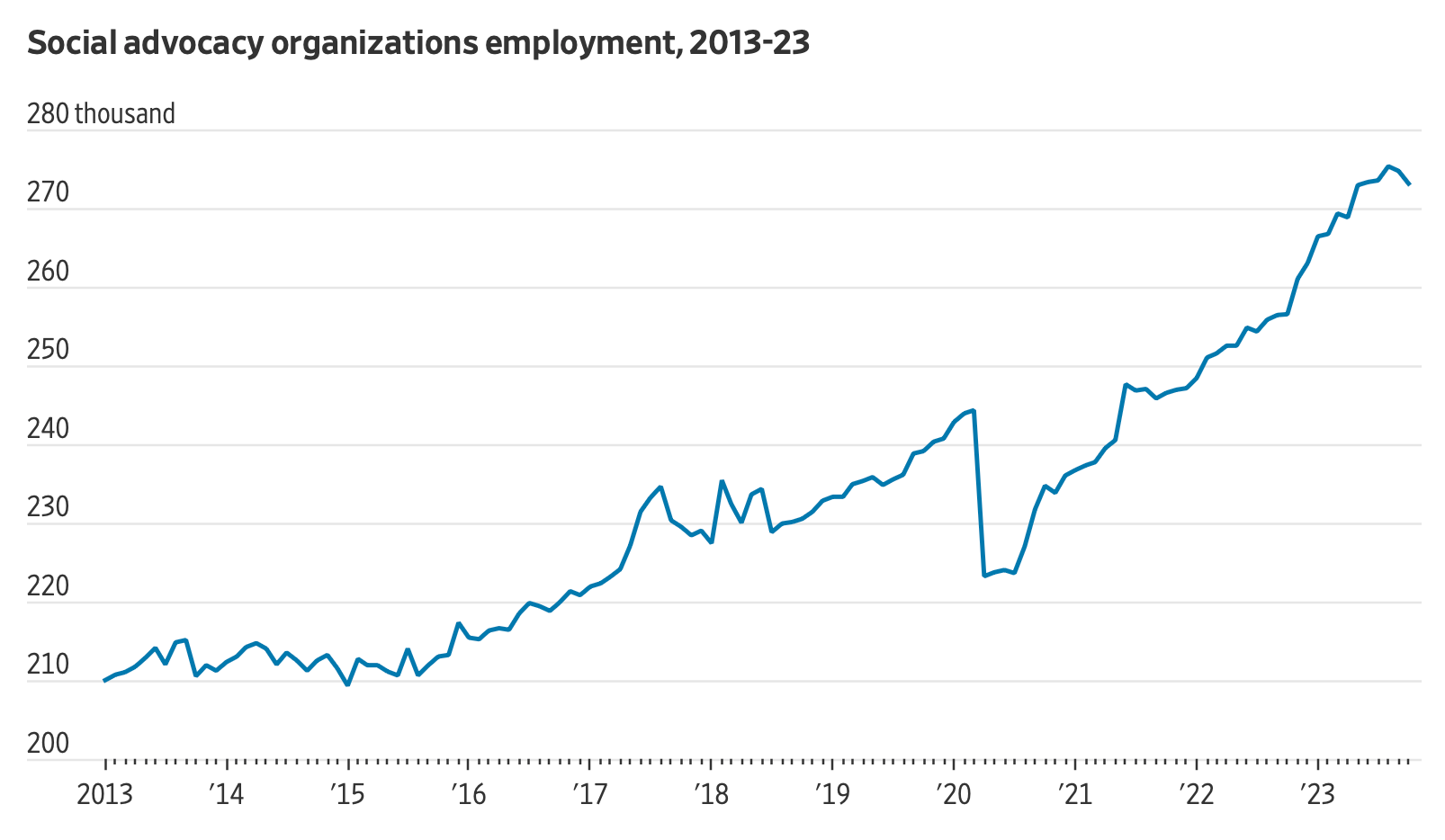
Public-choice theory assumes people are guided by their self-interest. Progressive government and the groups that feed on it have a vested interest in not solving pressing social problems. Treating mental illness and drug addiction, and getting the homeless into productive jobs, would mean fewer jobs for the welfare-industrial complex.
It’s amusing, then, to hear Democratic leaders like Mr. Adams and Chicago Mayor Brandon Johnson scapegoat migrants for their cities’ vagrancy and budget deficits. How do they explain Texas? The Lone Star State’s foreign-born population has increased by far more than New York’s over the past few years, yet it has 75% fewer homeless people than the Empire State.
In October the Texas comptroller projected an $18.3 billion budget surplus. The state doesn’t have a budget deficit or a homeless problem because it doesn’t spend lavishly on welfare or tolerate public disorder. Migrants who arrive and stay in Texas can get jobs off the books that can support them, unlike in New York and Illinois, where there is less demand for labor.
Migrants aside, the biggest money pit for Democrat-governed states is Medicaid. New York spends about 2.5 times as much per capita on Medicaid as Texas. The Empire State’s spending on the program in the past year alone increased by $13 billion—roughly what Mr. Adams projects migrants will cost his city over three years.
More spending on Medicaid, migrants and the homeless means more jobs for the welfare-industrial complex. Government, social assistance and healthcare made up most, and in some cases more than all, of the net new jobs over the past year in California (61%), New Jersey (81%), Oregon (89%), Michigan (113%), Illinois (113%) and New York (121%).
The last three states lost jobs in several industries, including manufacturing and tech, but they were more than offset by gains in government, social assistance and healthcare. These sectors made up a much smaller share of new jobs in Texas (34%), South Carolina (37%), Indiana (39%), Florida (41%) and Georgia (48%).
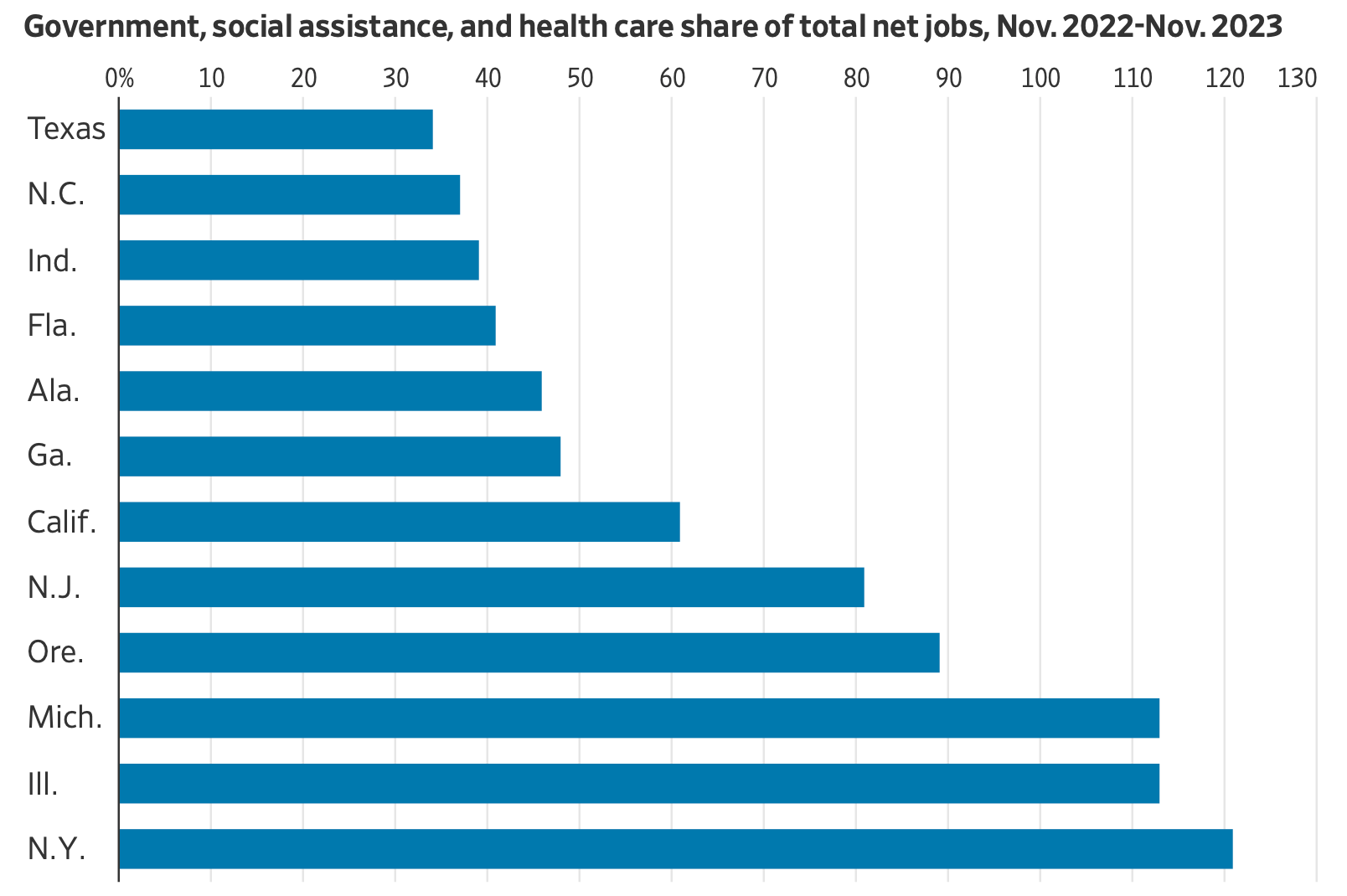
President Biden won’t admit it, but he has Republican states to thank for the increase in productive jobs in private industry. The administration’s bet is that government spending on welfare and entitlements can continue to power the U.S. labor market even as job growth in manufacturing, tech, retail and other industries flags. But social make-work projects don’t improve American living standards.
Aside from two years of runaway inflation, one way to explain Americans’ malaise is that they sense most new jobs aren’t making them or most people they know better off. The main beneficiaries are workers in the welfare-industrial complex.
-
Jon Bell Edwards gave his departure speech this week. I think Edwards has been a mixed bag. He was able to get teachers a raise(sadly, not enough) and he's worked pretty well with the agriculture and oil industries.
One thing he's proud of, but I think has hurt the state, is the expansion of Medicaid.
Louisiana is a poor state, with a lot of poor inner city blacks and poor rural whites. All that poor runs into a lot of Medicaid money. I think we need to go back to the future, in Louisiana and other states with high Medicaid levels. We need a return to state-run healthcare facilities, functioning as HMO's for Medicaid patients. Hub (university hospitals) and spoke (healthcare clinics, scattered throughout the state), with a healthy dose of telemedicine continuing care.
Of course, the second prong of the attack on high Medicaid levels is an aggressive jobs program. Training, entrepreneurial skills, business skills and tax policy can help people into better jobs. Better jobs mean higher incomes and less Medicaid costs.
-
Behind their paywall...
While the prevailing post-payrolls narrative has focused on the surprisingly strong headline payrolls number (at 216K, this not only came above most estimates but was the highest in 4 months, denting the Fed's case for a March rate cut) and the far stronger than expected hourly earnings (which rose to 4.1%, but only because hours worked dropped again to 34.3, a level last seen in the pre-covid days from 34.4) and unchanged unemployment rate, which at 3.7% further makes the case for rate cuts quite challenging, a closer look at the details of today's jobs report reveals just how ugly the reality behind the the Budget-Busting Bidenomics truly is.
Let's start with the now monthly revisions.
Regular readers are aware that earlier this year we spotted a peculiar trend when it comes to economic data releases by the Biden admin which - without fail - had been revised lower...and this month was no different. In fact, as shown in the chart below, the jobs print from 10 of the past 11 months has been revised lower! Why? So that the White House can take credit for a strong number (one which also sparks algorithmic buying in the market) only to quietly revise it lower one and two months later when nobody is looking.
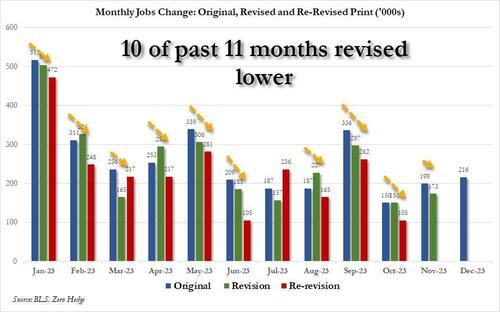
But that's just the start. Next we turn to the numbers behind the headline job prints which were rather terrible: the monthly nonfarm payrolls (from the Establishment Survey) may have been weak at 216K but the far more accurate Household Survey showed that the number of Employed workers actually collapsed by an unprecedented 683K, the biggest drop since the US economy was shutdown by covid!
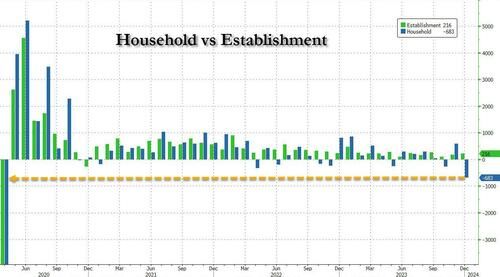
Even scarier, while the monthly grind higher in the payrolls number (pulled from the far less accurate Establishment Survey) means that US jobs hit a record high every month with bizarre consistency and in December this was certainly the case, the total nonfarm employment number rose to an all time high 157.232 million, the abovementioned collapse in US Employment (per Household survey) meant that there were only 161.183 million employed people in the US, the lowest since June, with the now traditional divergence between these two surveys glaringly obvious in the chart below.
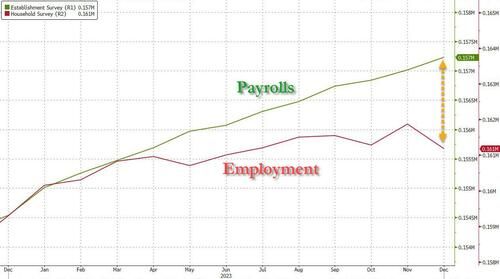
...
Here, one look at this month's adjustment and it's literally a shocker: you will not hear anyone from the Biden admin, the mainstream media, or associated economist cheerleaders mention this, but the BLS reported that in December the number of full-time jobs plunged by 1.531 million to 133.2 million, the biggest monthly drop since the record covid crash of 14.7 million jobs!
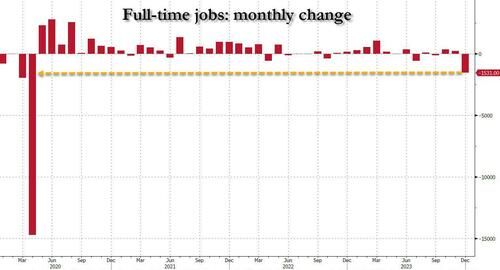
But wait, there's more, because going back to a quantitative read of the data, we look at the number of multiple jobholders - those workers who have to work more than one job at a time to make ends meet. In December, that number surged by 222K, and at 8.565 million was the highest print on record!
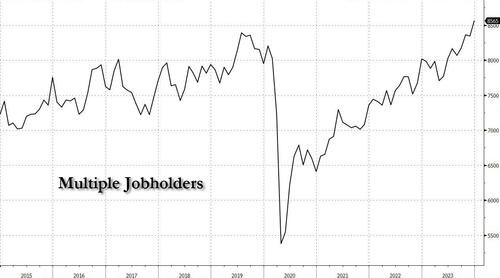
But wait there's even more, because just as we enter the peak of election season and political talking points will be thrown around left and right, especially in the context of the immigration crisis created intentionally by the Biden administration (maybe the US can hold the presidential election in Honduras or Guatemala, after all it is their citizens that will be (illegally) casting the key votes in November), what we find is that in December, the number of native-born worker
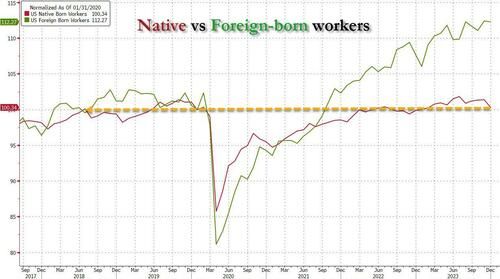
-
Behind their paywall...
While the prevailing post-payrolls narrative has focused on the surprisingly strong headline payrolls number (at 216K, this not only came above most estimates but was the highest in 4 months, denting the Fed's case for a March rate cut) and the far stronger than expected hourly earnings (which rose to 4.1%, but only because hours worked dropped again to 34.3, a level last seen in the pre-covid days from 34.4) and unchanged unemployment rate, which at 3.7% further makes the case for rate cuts quite challenging, a closer look at the details of today's jobs report reveals just how ugly the reality behind the the Budget-Busting Bidenomics truly is.
Let's start with the now monthly revisions.
Regular readers are aware that earlier this year we spotted a peculiar trend when it comes to economic data releases by the Biden admin which - without fail - had been revised lower...and this month was no different. In fact, as shown in the chart below, the jobs print from 10 of the past 11 months has been revised lower! Why? So that the White House can take credit for a strong number (one which also sparks algorithmic buying in the market) only to quietly revise it lower one and two months later when nobody is looking.

But that's just the start. Next we turn to the numbers behind the headline job prints which were rather terrible: the monthly nonfarm payrolls (from the Establishment Survey) may have been weak at 216K but the far more accurate Household Survey showed that the number of Employed workers actually collapsed by an unprecedented 683K, the biggest drop since the US economy was shutdown by covid!

Even scarier, while the monthly grind higher in the payrolls number (pulled from the far less accurate Establishment Survey) means that US jobs hit a record high every month with bizarre consistency and in December this was certainly the case, the total nonfarm employment number rose to an all time high 157.232 million, the abovementioned collapse in US Employment (per Household survey) meant that there were only 161.183 million employed people in the US, the lowest since June, with the now traditional divergence between these two surveys glaringly obvious in the chart below.

...
Here, one look at this month's adjustment and it's literally a shocker: you will not hear anyone from the Biden admin, the mainstream media, or associated economist cheerleaders mention this, but the BLS reported that in December the number of full-time jobs plunged by 1.531 million to 133.2 million, the biggest monthly drop since the record covid crash of 14.7 million jobs!

But wait, there's more, because going back to a quantitative read of the data, we look at the number of multiple jobholders - those workers who have to work more than one job at a time to make ends meet. In December, that number surged by 222K, and at 8.565 million was the highest print on record!

But wait there's even more, because just as we enter the peak of election season and political talking points will be thrown around left and right, especially in the context of the immigration crisis created intentionally by the Biden administration (maybe the US can hold the presidential election in Honduras or Guatemala, after all it is their citizens that will be (illegally) casting the key votes in November), what we find is that in December, the number of native-born worker

@George-K said in Bidenomics At Work:
But wait there's even more, because just as we enter the peak of election season and political talking points will be thrown around left and right, especially in the context of the immigration crisis created intentionally by the Biden administration (maybe the US can hold the presidential election in Honduras or Guatemala, after all it is their citizens that will be (illegally) casting the key votes in November), what we find is that in December, the number of native-born worker
You can blame me and other foreign workers for many things, but your shitty choice of political leaders isn't one of them.
You did that to yourselves.
-
@George-K said in Bidenomics At Work:
But wait there's even more, because just as we enter the peak of election season and political talking points will be thrown around left and right, especially in the context of the immigration crisis created intentionally by the Biden administration (maybe the US can hold the presidential election in Honduras or Guatemala, after all it is their citizens that will be (illegally) casting the key votes in November), what we find is that in December, the number of native-born worker
You can blame me and other foreign workers for many things, but your shitty choice of political leaders isn't one of them.
You did that to yourselves.
@Doctor-Phibes said in Bidenomics At Work:
You can blame me and other foreign workers for many things, but your shitty choice of political leaders isn't one of them.
Aren't there proposals for non-citizens to vote?
Join the fun!
-
@George-K said in Bidenomics At Work:
But wait there's even more, because just as we enter the peak of election season and political talking points will be thrown around left and right, especially in the context of the immigration crisis created intentionally by the Biden administration (maybe the US can hold the presidential election in Honduras or Guatemala, after all it is their citizens that will be (illegally) casting the key votes in November), what we find is that in December, the number of native-born worker
You can blame me and other foreign workers for many things, but your shitty choice of political leaders isn't one of them.
You did that to yourselves.
@Doctor-Phibes said in Bidenomics At Work:
@George-K said in Bidenomics At Work:
But wait there's even more, because just as we enter the peak of election season and political talking points will be thrown around left and right, especially in the context of the immigration crisis created intentionally by the Biden administration (maybe the US can hold the presidential election in Honduras or Guatemala, after all it is their citizens that will be (illegally) casting the key votes in November), what we find is that in December, the number of native-born worker
You can blame me and other foreign workers for many things, but your shitty choice of political leaders isn't one of them.
You did that to yourselves.
Hey, I didn't vote for Biden!
-
@Doctor-Phibes said in Bidenomics At Work:
@George-K said in Bidenomics At Work:
But wait there's even more, because just as we enter the peak of election season and political talking points will be thrown around left and right, especially in the context of the immigration crisis created intentionally by the Biden administration (maybe the US can hold the presidential election in Honduras or Guatemala, after all it is their citizens that will be (illegally) casting the key votes in November), what we find is that in December, the number of native-born worker
You can blame me and other foreign workers for many things, but your shitty choice of political leaders isn't one of them.
You did that to yourselves.
Hey, I didn't vote for Biden!
@Jolly said in Bidenomics At Work:
Hey, I didn't vote for Biden!
I'd be willing to bet that you voted for a shithead nonetheless.
-
-
@Doctor-Phibes said in Bidenomics At Work:
Link to video@Jolly said in Bidenomics At Work:
No, I didn't vote for you.

-
Meanwhile, back to the subject...Since TDS has had its momentary spotlight...
- Foreclosures are up.
- The Biden Administration has consistently circled back and revised employment figures down. Sometimes, as much as 30%.
- Government jobs have been growing at an alarming rate.
- The number of people working two jobs is very high.
- The Household Survey shows a big drop in jobs.
- Home sales have plunged.
- The average family needs over $11,000 more, to achieve the same living standard as when Biden took office.
- The number of foreign workers has skyrocketed.
What did I miss?
-
Meanwhile, back to the subject...Since TDS has had its momentary spotlight...
- Foreclosures are up.
- The Biden Administration has consistently circled back and revised employment figures down. Sometimes, as much as 30%.
- Government jobs have been growing at an alarming rate.
- The number of people working two jobs is very high.
- The Household Survey shows a big drop in jobs.
- Home sales have plunged.
- The average family needs over $11,000 more, to achieve the same living standard as when Biden took office.
- The number of foreign workers has skyrocketed.
What did I miss?
-
@Jolly said in Bidenomics At Work:
What did I miss?
Much of that (not the housing data) is in the post from ZeroHedge.
@George-K said in Bidenomics At Work:
@Jolly said in Bidenomics At Work:
What did I miss?
Much of that (not the housing data) is in the post from ZeroHedge.
Sure is. I was trying to pull a summation from the thread. I probably left out something.